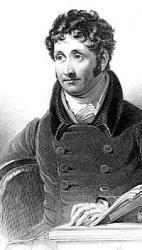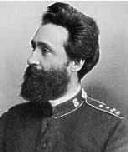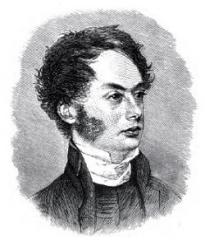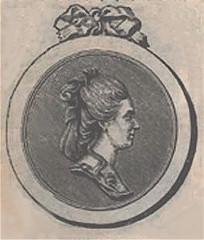Planning worship?
Check out our sister site, ZeteoSearch.org,
for 20+ additional resources related to your search.
- |
User Links
Person Results
Thomas Campbell

1777 - 1844 Composer of "SAGINA (Short)" in The Cyber Hymnal Campbell, Thomas, the Poet, has little in common with hymnody. A few of his pieces, including," When Jordan hushed its waters still," are found in a limited number of hymnals. His poetical works, The Pleasures of Hope, Gertrude of Wyoming, and others, have been reprinted several times. He was born at Glasgow, 1777; died at Boulogne, 1844, and was buried in Westminster Abbey.
--John Julian, Dictionary of Hymnology (1907)
Thomas Campbell
Arthur Sydney Booth-Clibborn

1855 - 1939 Person Name: Arthur S. Booth-Clibborn Author of "O God of Light" in The Cyber Hymnal Commissioner Arthur Sydney Booth-Clibborn (née Clibborn) (1855 – 20 February 1939) was a pioneering early Salvation Army officer in France and Switzerland, and the husband of Kate Booth, the oldest daughter of General William and Catherine Booth.
See also in:
Wikipedia
Arthur Sydney Booth-Clibborn
R. C. Waterston
1812 - 1893 Author of "O God of light and love" Waterston, Robert Cassie, M.A., son of Robert Waterston, was born at Kennebunk, in 1812, but has resided from his infancy at Boston, Massachusetts. He studied Theology at Cambridge; had for five years the charge of a Sunday school for the children of seamen; was associated for several years with the Pitts Street Unitarian Chapel, Boston; and then pastor for seven years of the Unitarian Church of the Saviour in the same city. Much of his time has been given to literature, and a long list of his papers of various kinds is given in Putnam's Singers and Songs of the Liberal Faith, 1874. He also interested himself largely in educational matters. He contributed one hymn to the American Unitarian Cheshire Pastoral Association Christian Hymns, 1844; to his own popular Supplement to Greenwood's Psalms and Hymns, 1845, and others to various works. Putnam gives 20 poetical pieces in his Singers and Songs, &c, 1874, amongst which are the following, which are in common use at the present time:—
1. In darkest hours I hear a voice. Looking unto Jesus. Contributed to Putnam's Singers and Songs, &c, 1874, and found in a few collections.
2. In each breeze that wanders free. Nature and the Soul. Published before 1853, and again in Putnam, 1874. The hymn "Nature, with eternal youth," in Hedge and Huntington's Hymns for the Church of Christ, 1853, No. 185, is composed of stanza iv-vii. of this piece.
3. One sweet [bright] flower has drooped and faded. Death of a Child. Appeared in the American Unitarian Cheshire Pastoral Association Christian Hymns, 1844, No. 668, and again in Putnam, 1874, as “One bright flower, &c." It is in several collections. In the Christian Hymns the heading is "Death of a Pupil;" and Putnam, "On the Death of a Child. Sung by her classmates."
In Putnam there are other pieces by him which are worthy of attention. [Rev. F. M. Bird, M.A.]
-- John Julian, Dictionary of Hymnology (1907)
R. C. Waterston
Edward Churton

1800 - 1874 Author of "God of Love, O let Thy light" Churton, Edward, D.D., son of the Ven. Ralph Churton, sometime Archdeacon of St. David's and Hector of Middleton Cheney, Northampton, was born in 1800, and educated at the Charterhouse and Christ Church, Oxford, where he graduated in honours, in 1821. He was for some time one of the Masters at Charterhouse. He took Holy Orders in 1826; was the first Head Master of the Hackney Church of England School, 1830; Rector of Crayke, 1835; Prebendary in York Cathedral, 1841; and Archdeacon of Cleveland, 1846. He died July 4, 1874.
Archdeacon Churton's works include: (1) The Early English Church, 1840. (2) Memoir of Bishop Pearson, 1844. (3) Lays of Faith and Royalty, 18-15. (4) Memoir of Joshua Watson, 1861. He also edited several works, including Lays of Faith and Royalty, 1845, &c. He is known to hymnology through his work, The Book of Psalms in English Verse, 1854. This is commonly known as the Cleveland Psalter. The Preface is of more than usual interest and value. Of his renderings of the Psalms, some of which are of great excellence a few have come into common use, the best known being, “God of grace, O let Thy light." The following, mainly in Kennedy, 1863, are from the Cleveland Psalter:—
1. Come, arise and let us go. Ps. cxxxii.
2. Earth with all thy thousand voices. Ps. lxvi.
3. For ever, Lord, Thy faithful word. Ps. cxix. .
4. God of truth, all faithful Lord. Ps. cxliii.
5. God my hope, my strength, my King. Ps. cxlv.
6. God rules in realms of light. Ps. xciii.
7. How shall I render to my God. Ps. cxvi.
8. I lift mine heart to Thee. Ps. xxv.
9. If our God had not befriended. Ps. cxxiv.
10. In Thee, O Lord, I trust. Ps. xxxi.
11. Lord, hear me, grant my sorrows boon. Ps. lv.
12. Lord, hear my suppliant prayer. Ps. cxxx.
13. Lord, hear the voice of my complaint. Ps. v.
14. Lord, I have called on Thee; for Thou. Ps. xvii.
15. Lord, my heart is with the lowly. Ps.cxxxi.
16. Lord, my Rock, to Thee I cry. Ps. xxviii.
17. Lord, to my sad voice attending. Ps. lxi.
18. O happy state on earth to see. Ps. cxxxiii.
19. O praise the Lord, for He is love. Ps. cxxxvi.
20. O stand in awe, and fear to sin. Ps. iv.
21. Raise the psalm to God all glorious. Ps. xcviii.
22. 'Tis the day all days excelling. Ps. cxviii.
23. To Thee our guilty deeds. Ps. xc.
24. Whene'er to Thee I make my prayer. Ps. lvi.
Archdeacon Churton's translations from the Latin, Spanish, and Anglo-Saxon, were included in his Poetical Remains, Lond., 1876.
--John Julian, Dictionary of Hymnology (1907)
=================
Churton, Edward, p. 233, ii. From his Cleveland Psalter the following are also in common use:—
1. High raised upon the holy hills. Ps. lxxxvii. It begins in some collections with stanza ii., "O Zion, glorious things to come."
2. Lord, keep me for I trust in Thee, Be Thou. Ps. xvi, Cistercian Breviary, p. 179, i.
--John Julian, Dictionary of Hymnology, Appendix, Part II (1907)
Edward Churton
Ludvig Mathias Lindeman

1812 - 1887 Person Name: L. M. Lindeman, 1812-87 Arranger of "DER TAG, DER IST SO FREUDENREICH" in Evangelical Lutheran Hymnary Ludvig M. Lindeman (b. 1812; d. 1887) was a Norwegian composer and organist. Born in Trondheim, he studied theology in Oslo where he remained the rest of his life. In 1839 he succeeded his brother as the organist and cantor of Oslo Cathedral, a position he held for 48 years up until his death. Lindeman was appointed Knight of the Royal Norwegian Order of St. Olav, and was invited to both help christen the new organ in Royal Albert Hall in London, as well as compose for the coronation of King Oscar II and Queen Sophie of Sweden. In 1883, he and his son started the Organist School in Oslo. Lindeman is perhaps best known for his arrangements of Norwegiam folk tales; over the course of his life he collected over 3000 folk melodies and tunes.
Laura de Jong
Ludvig Mathias Lindeman
George Taylor Rygh
1860 - 1942 Person Name: G. A. T. Rygh, 1860-1942 Translator of "O Light of God's Most Wondrous Love" in Evangelical Lutheran Hymnary
George Taylor Rygh
Birgitte K. Boye

1742 - 1824 Person Name: B. K. Boye, 1742-1824 Author of "O Light of God's Most Wondrous Love" in Evangelical Lutheran Hymnary Birgitte was born on March 7, 1742, in Gentofte, Denmark. She was the daughter of Jens Johansen. Boye married a supreme court judge in Copenhagen, Denmark. She found time to study German, French and English and translated hymns into Danish from these languages. As a hymnist, she was involved with Guldbergs og Harboes Psalmebog (Ove Guldberg’s and Ludvig Harboe’s Psalter), to which she contributed 146 hymns. She also produced "national dramatic writing." She died on October 17, 1824.
Sources: Julian, p. 1001 & Stulken, p. 145
Birgitte K. Boye


 My Starred Hymns
My Starred Hymns


